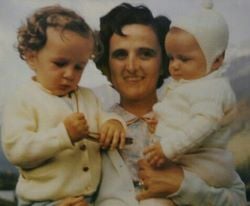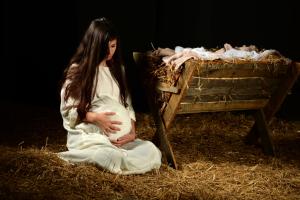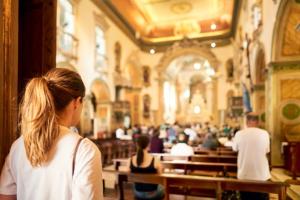 Today is the feast of St. Gianna Beretta Molla, an Italian physician who died of septic peritonitis on April 28, 1962, following the birth of her fourth child. Every year around this time, Catholic and pro-life social media is filled with tributes to Gianna’s heroism in refusing an abortion to save her own life, essentially turning her story into a morality play.
Today is the feast of St. Gianna Beretta Molla, an Italian physician who died of septic peritonitis on April 28, 1962, following the birth of her fourth child. Every year around this time, Catholic and pro-life social media is filled with tributes to Gianna’s heroism in refusing an abortion to save her own life, essentially turning her story into a morality play.
The lovely young Wife and Mother, so goes the story, bravely scorns her Evil Physicians’ advice to abort her Unborn Child, triumphantly Giving Birth against all odds, dying in the Odor of Sanctity and Raised to the Altars as an Example to women everywhere about the Perils of Free Choice.
Except that’s not how the story really went.
When Gianna was diagnosed with a uterine fibroma early in her pregnancy, her doctors outlined her options: abortion (presumably along with removal of the fibroma), complete hysterectomy, or removal of the fibroma alone. “Emptying” her womb would have saved the womb and, possibly, Gianna’s fertility, but would have resulted in a direct abortion of the unborn child. Removing the womb (and its contents) would have taken care of the fibroma, but would have resulted in an indirect abortion and in sterility for Gianna. But if the fibroma alone could be removed, the child’s life could be spared and, perhaps, left the possibility of more children. Of course, the risk was that the surgeon might not be able to remove the entire fibroma without harming the child in the process.
Gianna, as a practicing Catholic, would have known that direct abortion, either as an end or as a means to an end, wasn’t morally permissible. As religiously-educated woman, who had been mentored by an archbishop and had relatives who were priests, she presumably knew that a hysterectomy under these conditions was morally permissible under the principle of double effect. And, as a physician herself, Gianna undoubtedly knew the risks to herself and to her child by opting for surgery to remove the fibroma. (It wouldn’t have escaped her notice, as it often does for many pro-life advocates, that her child could have been maimed during the surgery and left alive but disabled.)
Knowing all this, Gianna chose the option that offered the best chance of saving her child’s life. The surgery was a success and her pregnancy continued. The baby, a girl, was born on April 21, 1962; Gianna died of complications from infection a week later.
Pro-life advocates frame Gianna’s story as a struggle between good and evil, of a saintly woman laying down her life rather than commit the sin of abortion, but the reality is that there were no villains in this story. Gianna’s doctors fulfilled their duty to outline all of the options available to Gianna, respecting her intelligence and her agency in participating in her own treatment.
When Gianna chose the option that carried the most risk to both mother and child, her doctors respected that choice and managed to remove the fibroma without harm to the unborn child. The fact that her doctors weren’t able to save her life a second time, after she gave birth, doesn’t negate the fact that they acted heroically in saving both mother and child earlier when the fibroma was removed.
The story might have remained a private family drama, inspiring to Gianna’s family and friends but otherwise unknown, except that her widower decided to publish a book about Gianna’s life in 1971. Evidently, the book drew a lot of attention in Italy because, the following year, the Archbishop of Milan quickly proposed Gianna for sainthood. Around the same time, which was undoubtedly no coincidence, abortion was being legalized around the world. (Legal abortion began in the U.K. in 1968; it would be legalized in the U.S. in 1973.) Gianna was quickly co-opted by pro-lifers as a heroine for their cause.
Without free choice, Gianna wouldn’t have been a heroine. Freedom is a necessary component of virtue, so much so that God allows for the possibility of evil to give us the possibility of freely choosing good. The Catechism of the Catholic Church states:
Freedom is the power, rooted in reason and will, to act or not to act, to do this or that, and so to perform deliberate actions on one’s own responsibility. By free will one shapes one’s own life. Human freedom is a force for growth and maturity in truth and goodness; it attains its perfection when directed toward God, our beatitude (CCC 1731).
Had Gianna’s doctors withheld from her all of her options, she wouldn’t have been able to make the choice she did to consciously choose the option that offered the best chance to save her child’s life. She not only was able to choose to save her child, she also was able to become a formidable advocate for her child, famously telling her doctors, “If you have to choose between us, choose the child. I demand it!”
It wasn’t just her doctors who respected Gianna’s agency, but also her husband. In an era when men had considerable power over their wife’s medical choices, Gianna’s story is notable for the fact that her husband doesn’t appear to have had much of a public role in the decision-making process. While we can assume that Gianna and her husband discussed her treatment options privately, we see only Gianna informing the doctors of the choice she’s made. She said, “I demand,” not “my husband demands.” Years later, Pietro Molla would tell their daughter of “her mother’s choice,” one that was made “as both a loving mother and a doctor.”
Pro-life activists battle for laws against abortion, laws that seek to strip women of the ability to freely choose. In Arizona yesterday, the day before St. Gianna’s feast day, the Republican governor signed a bill that bans abortion in cases of genetic anomalies:
Arizona Gov. Doug Ducey on Tuesday signed a sweeping anti-abortion bill that bans the procedure if the woman is seeking it solely because a fetus has a genetic abnormality such as Down syndrome. Doctors who perform an abortion solely because the child has a survivable genetic issue can face felony charges. The proposal also contains a raft of other provisions sought by abortion opponents.
Conservatives celebrated the passage of the law, informing the press in a news release, “Life wins!” But there was no word on what measures would be taken in Arizona to provide women and their families with the resources necessary to care for the special-needs children they would be forced to carry to term, without even the dignity and comfort of having freely chosen life for their children.
In the homily during the Mass of canonization for Gianna, John Paul II said of her, “The extreme sacrifice she sealed with her life testifies that only those who have the courage to give of themselves totally to God and to others are able to fulfill themselves.” But the means by which Gianna was able to offer “the extreme sacrifice” was free choice. Without the choice to do good, subject to the choices of others such as her doctors and her husband, Gianna wouldn’t have been able to offer that sacrifice. She wouldn’t have been capable of becoming a saint.
Without free choice, there is no possibility of sanctity.
(Image: St. Gianna Beretta Molla and children; © José Luiz Bernardes Ribeiro / )











